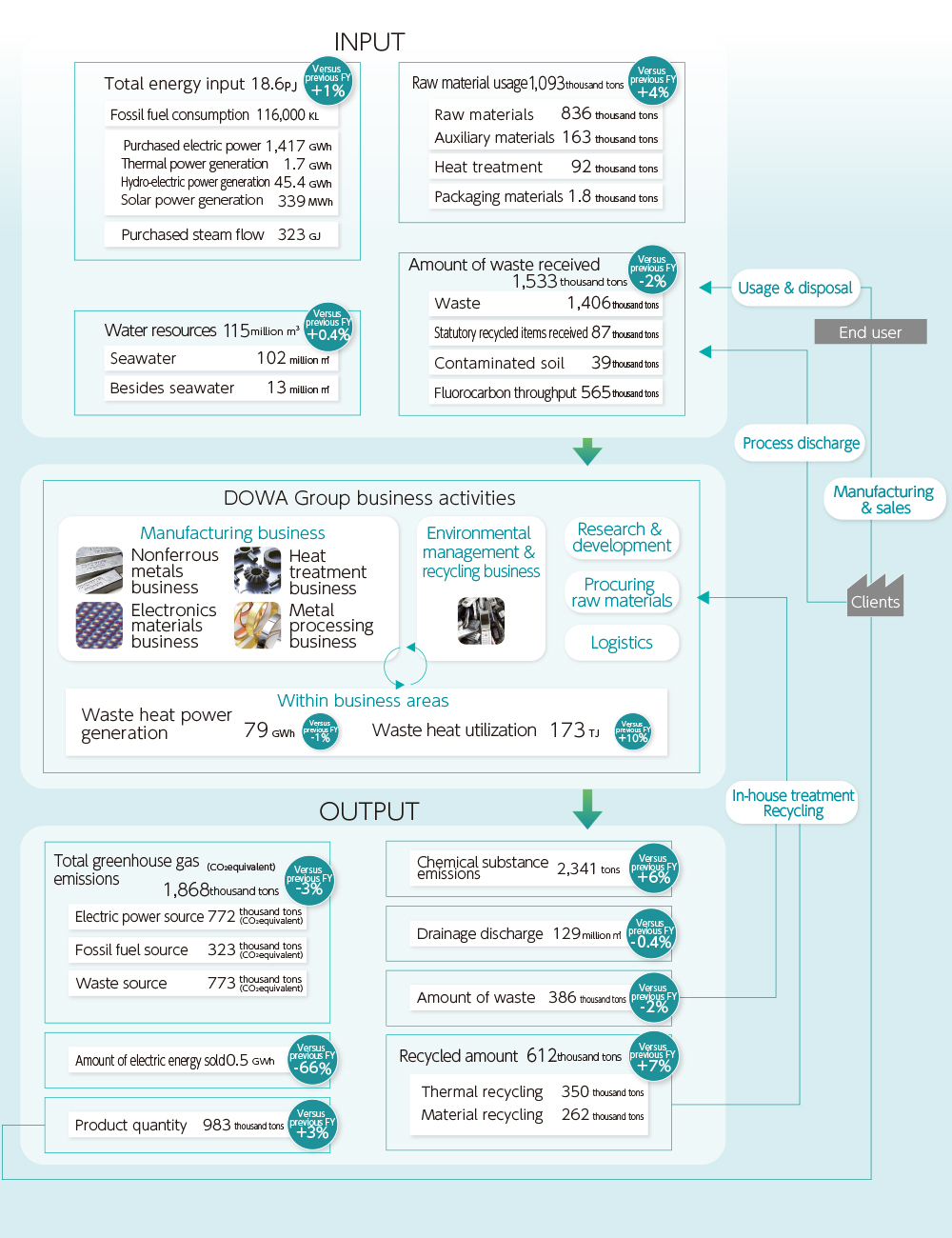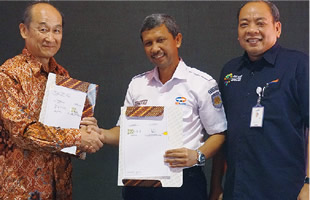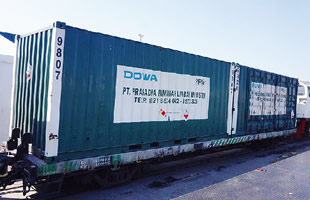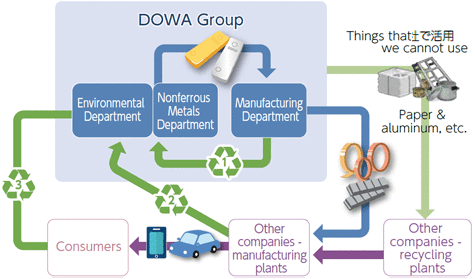About the Current Environmental Status―Initiatives For Climate Change
At the DOWA Group, based on the Action Plan to Implement a Low Carbon Society by the Keidanren (Japan Business Federation) and the Japan Mining Industry Association (announced in January 2013), we have set a goal of" a 15% reduction in our CO2 emission rate by FY 2020, compared to FY 1990".
Reduction of Greenhouse Gas Emissions
In FY 2018, the greenhouse gas emissions by the DOWA Group as a whole were about 1,868 thousand tons CO2 (1,748 thousand tons CO2 in Japan, and 120 thousand tons CO2 overseas). Compared to the previous FY, it decreased by about 3% in Japan and overseas.
Electric power source
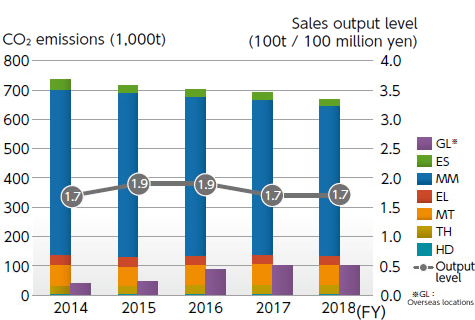
Fossil fuel source
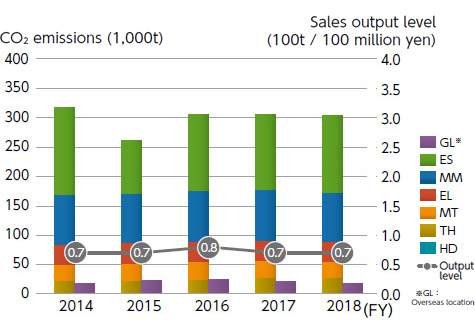
Initiatives for Renewable Energy
We are working on climate change measures through utilization of in-house power generation by renewable energy, and the dissemination of renewable energy through our business.
At Kosaka Smelting & Refining (Akita Prefecture), in 1897 (Meiji 30) we began operating a hydroelectric power plant for the use of mine development, only the second such plant in Japan. Since then, as we expanded our business, we continued to expand and improve our facilities, and now we have six hydroelectric power plants in Akita Prefecture. In FY 2018, we generated 45.4 GWh, which is an important power source to cover the energy of Kosaka Smelting & Refining. In addition, we are introducing solar power generation systems at the Ohta Plant of Thermoengineering (Gunma Prefecture), Meltec (Tochigi Prefecture), DOWA Hightech (Saitama Prefecture), Eco-Sys tem Sanyo (Okayama Prefecture) and Act-B Recycling (Kumamoto Prefecture). In FY 2018, the total power generation of the five companies was 339MWh, and it is used for part of our electric power needs in our business activities.

Launch of Indonesia's First Hazardous Waste Rail Transport
In August 2018, PPLi, which has the only approved hazardous waste final disposal site in Indonesia and provides comprehensive waste management services, launched the country's first rail transport of hazardous waste in collaboration with the Indonesian national railways and it's operating subsidiary KALOG. Trucks took about three days to transport this, but by switching to rail it now takes about one day, and it can be safely transported on a more stable schedule. It is also known that railroads emit significantly less CO2 per unit of transport volume than automobiles.
With the cooperation of the Indonesian regulatory authorities, the Indonesian national railways and it's logistics subsidiary, this project took four years to achieve through persistent trial operations. The DOWA Group contributes to solving environmental issues in Asia by cooperating with governments, regions and operating companies in various sectors.
Conservation of Water Resources
Every year the DOWA Group confirms the status for water intake sources and drainage destinations in addition to water usage at production sites in Japan and overseas. We are working to reduce the amount of water used throughout the entire group by promoting efficient use within business sites to reduce the quantity of water intake.
Water Resources
In FY 2018, the water resource input amount was 114.9 million ㎥, an increase of about 0.4% from the previous FY. Our most common use of water resources is for cooling water used in the smelting process, which uses seawater. Freshwater usage is about 10% of the total, but increased by 2.3% versus the previous FY to 13 million ㎥.
In FY 2018, we worked on reducing the amount of water usage by installing water-saving type equipment and recycling usage within processes.
Drainage Water
In FY 2018, the total amount of drainage water was 129 million ㎥, a decrease of about 0.4% from the previous FY. Most of the cooling water for smelting uses seawater, and after using it in the process, we check the water quality and return it to the original sea area.
At each business site, we ensure drainage water management and we are working to conserve water quality, not only observing drainage water regulations but also strict voluntary standards.
Amount of water resources used
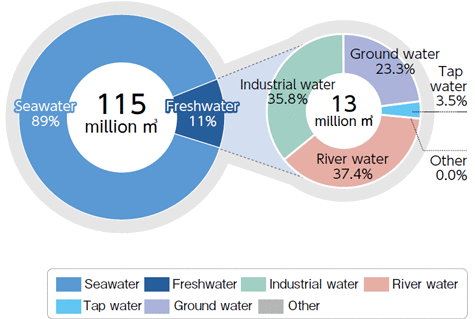
Conservation of biodiversity
Based on the basic policy of biodiversity, the DOWA Group is working to minimize the impact that our business activities have on biodiversity, and we are promoting the conservation of biodiversity through social action programs.
Basic policy of biodiversity
The DOWA Group recognizes that our business activities get benefits from a biodiverse nature, and the conservation of biodiversity is important to keep enjoying these benefits. As a member of society, we will voluntarily and continuously work on the TOPICS conservation of biodiversity and sustainable usage.
Consideration for biodiversity in procurement
Supplying paper, a forest resource, is one of the important ecosystem services, and it is also related to climate change and waste. Because the company's manufacturing business is mainly in the area of non-ferrous metals, we do not use biological resources for our main raw materials, excluding water, but we use paper at all our business sites both in Japan and overseas, and our whole group purchases a lot of paper every year. For this reason, we use paper that is a mixture of old paper and forest certified wood pulp for copy paper and pamphlets, and we are working to use sustainable biological resources.
When selecting suppliers of paper for FY 2018, in addition to the environmental nature of the paper itself, based on the CSR procurement policy, we confirmed that suppliers are considering biodiversity through "responsible paper procurement".
Resource Recycling Initiatives
At the DOWA Group we are working on effective utilization of limited resources through the three loops of our own manufacturing process, the manufacturing processes of other companies, and the waste generated by society. At the same time, as a social responsibility in resource recycling, together with striving to minimize the environmental impact at every stage of recycling, such as appropriate water treatment, detoxifying waste and reliable landfill, we are aiming for sustainable resource recycling that considers environmental conservation and energy savings, such as using heat generated in the treatment process as steam or electric power.
Three Resource Recycling Loops
①With in-house generation and usage, for waste generated in the" manufacturing business", such as our smelting and metal processing, it is recycled in the "environmental business" and "nonferrous metals business". Besides selling it as metallic material, we re-use it as raw material for our company.
②Accepting and recycling scrap metal generated from the processes of manufacturing plants at other companies. In case it is from client factories that supply our materials or par ts, such thin gs as reusing theaccepted waste as raw material leads to a reduction of new resource inputs.
③Recycling of used end products. Through electrical appliance recycling, automobile recycling and the recycling of small household appliances, used products widely recovered from society will be returned to society as metallic material again.
In addition, with regards to paper and aluminum, etc., that we cannot use, we strive to appropriately recycle through the recycling processes of other companies.
Raw materials Products
The amount of raw material used in FY 2018 was 1,093 thousand tons, up about 4% from the previous FY. Most of the raw material we use is ore for metal smelting, and it was around 69% of the total in FY 2018, followed by recyclable raw material such as scrap metal at about 14%.
Waste received
The amount of waste received in FY 2018 was 1,533 thousand tons, a decrease of approximately 2% from the previous FY, so about the same level.
Products
The product shipment volume in FY 2018 was 983 thousand tons, an increase of about 3% from the previous FY. This was mainly because of an increase in the amount handled due to improvement in the operation rate of heat treatment processing, and an increase in the number of heat treatment furnaces manufactured.
Discharged waste
The amount of waste treatment in FY 2018 was 386 thousand tons, a small decrease of approximately 2% from the previous FY.
Recycling
The amount of thermal recycling in FY 2018 was 350 thousand tons, a increase of approximately 8% from the previous FY. Of this, 43 thousand tons was recycled within the Group, and 306 thousand tons was recycled outside of the company.
The amount of material recycling in FY 2018 was 262 thousand tons, a decrease of approximately 5.6% from the previous FY. Of this,72 thousand tons was recycled within the Group, and 190 thousand tons was recycled outside of the company.

Lithium-ion Battery Recycling
Balance safe processing and efficient metal recycling
Due to their high output, high energy efficiency, small size and light weight, demand for lithium-ion batteries is growing as an indispensable battery for a wide range of electronic devices, from mobile phones to electric vehicles (EV). On the other hand, continuous and stable processing has not been established due to the danger of electric shock and fire during disposal and dismantling, and the value of recovered smelting raw materials being affected by the fluctuation in metal prices. There was a need for a safe and efficient recovery and recycling system for the future.
In January 2019, DOWA Eco-System, which has an environmental business, started operating a detoxified lithium-ion battery recycling line in Odate, Akita Prefecture. Since October 2018, DOWA Eco-System has been participating in the joint collection scheme for lithium-ion batteries launched by the Japan Automobile Manufacturers Association (general incorporated association). The DOWA Group's Eco-System Akita and Eco-System Sanyo are registered as battery recycling facilities.
Until now, after detoxifying lithium-ion batteries by heat treatment at several large incinerators owned by the DOWA Group, it was divided into iron and non-iron metal mixtures, and the metal mixture was melted by the DOWA Group's Meltec. It was then recycled into artificial aggregate for construction materials, and raw materials for smelting. The recycling line that is now in operation has a processing capacity of about 100 tons per month, and separates batteries that have been detoxified by heat treatment into iron, aluminum, copper and cobalt & nickel mixtures, etc. With this, we can recycle each metallic raw material more efficiently than at present, making it possible to achieve both safe processing and highly efficient recycling.
The DOWA Group will contribute to the conservation of the global environment by promoting stronger environmental and recycling services such as the appropriate processing and recycling of waste.
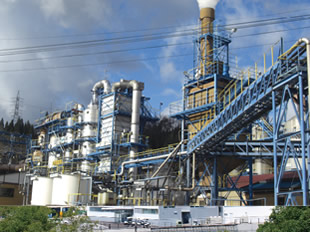
Eco-System Akita
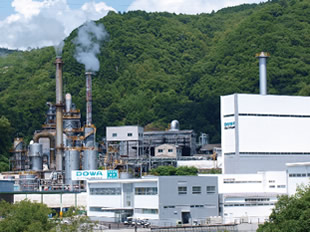
Eco-System Sanyo
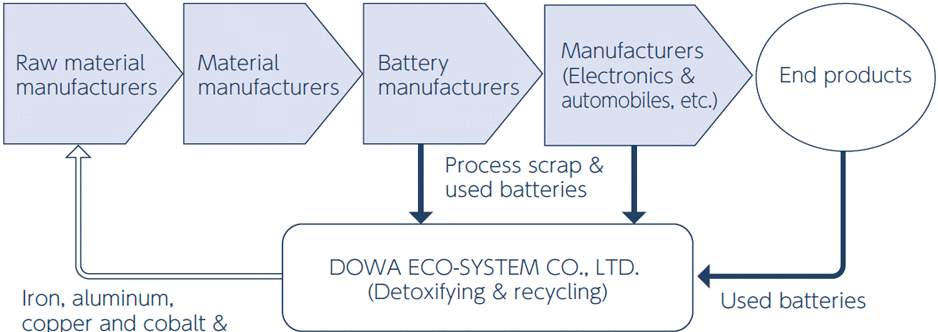
Flow of Lithium-ion Battery Manufacturing, Processing & Metal Recycling
